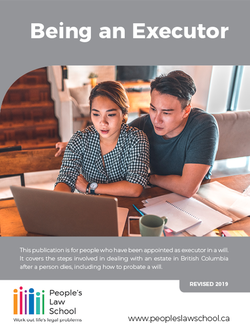Being an Executor: Difference between revisions
Jump to navigation
Jump to search
No edit summary |
Drew Jackson (talk | contribs) No edit summary |
||
| Line 1: | Line 1: | ||
{{Cover Thumbnail | {{Cover Thumbnail | ||
|filename = | |filename = Being an Executor full cover image.png | ||
|title = ''Being an Executor''}}{{Clicklaw Wikibooks Badge}} | |title = ''Being an Executor''}}{{Clicklaw Wikibooks Badge}} | ||
{{Export_Badge | {{Export_Badge | ||
Revision as of 22:42, 12 February 2016

|
|
This is a Clicklaw Wikibook, a collaborative, plain language legal publication that is updated as a wiki and can be printed or downloaded. |
|
|
Download the full Wikibook in PDF. |
|
|
Customize: take what you need, leave the rest (learn more). |
Being an Executor from People's Law School provides information about being an executor, which is the person named in a will to carry out the instructions in the will. This edition reflects the Wills, Estates and Succession Act, which became law in 2014.
Contents
About this Wikibook
- About Being an Executor
- Learn more about Clicklaw Wikibooks or visit other wikibooks from People's Law School
About People's Law School
The People's Law School is a non-profit charitable society whose purpose is to provide British Columbians with reliable information about their rights and responsibilities under the law.

- Suite 150 - 900 Howe Street
- Vancouver, BC V6Z 2M4
- Telephone: 604-331-5400
- Email: info@publiclegaled.bc.ca
- Website: www.publiclegaled.bc.ca